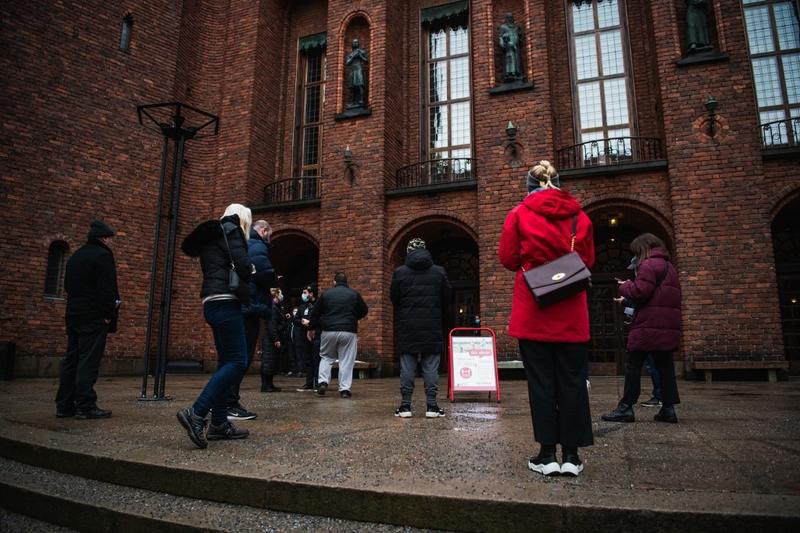 People wait for their turn to enter Stockholm's City Hall, known as venue for the Nobel Prize banquets and converted now into a COVID-19 vaccination centre for a day on Feb 21, 2021 in the capital of Sweden, amid the novel coronavirus pandemic. (JONATHAN NACKSTRAND / AFP)
People wait for their turn to enter Stockholm's City Hall, known as venue for the Nobel Prize banquets and converted now into a COVID-19 vaccination centre for a day on Feb 21, 2021 in the capital of Sweden, amid the novel coronavirus pandemic. (JONATHAN NACKSTRAND / AFP)
BRUSSELS/BERLIN-European Union government leaders were expected to agree on Thursday to maintain curbs on nonessential travel within the EU despite the bloc's executive asking six countries to ease border restrictions on Tuesday.
The executive European Commission is seeking a coordinated approach to border curbs among EU states
Unilateral moves by EU member countries to combat the spread of new coronavirus variants has disrupted the flow of goods within the bloc's 27-nation single market and risks shutting parts of the Franco-German border.
ALSO READ: UK gives EU more time to ratify post-Brexit deal
Draft conclusions for an EU leaders videoconference, seen by Reuters, said countries would agree nonessential travel in the bloc must remain restricted because the risk of COVID-19 remains serious and new virus variants pose additional challenges.
"Restrictive measures (regarding) nonessential travel may still be needed to contain the spread of the virus," European Council President Charles Michel wrote in a letter to EU government leaders.
'Gone too far'
The executive European Commission is seeking a coordinated approach to border curbs among EU states. It said on Tuesday it had given Belgium, Denmark, Finland, Germany, Hungary and Sweden 10 days to justify their unilateral restrictions, which Justice Commissioner Didier Reynders said had "gone too far".
A European Commission spokesman said the bloc risked "fragmentation and disruptions to free movement and to supply chains-something we have witnessed again the past weeks".
Germany, having introduced checks along its normally open frontiers with the Czech Republic and Austria, was in talks with France on averting similar measures in the eastern French Moselle region that borders Germany.
The Moselle region experienced a surge in a more easily transmissible variant of the coronavirus, as have Austria's Alpine Tyrol region and the Czech Republic.
READ MORE: Johnson's win may deliver Brexit but could risk UK's breakup
Austrian Chancellor Sebastian Kurz called for "common standards for travel and the transport of goods within the EU to ensure the functioning of the single market".
Michael Roth, Germany's Europe Minister, defended Berlin's actions.
"These measures obviously put a massive strain on border regions …but the protection of our citizens is paramount."


